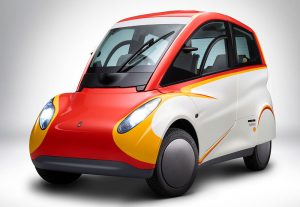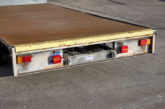
Shell has unveiled a concept city car which, if it were ever to go into production, could deliver material reductions in energy use in the road transport sector.
The three seater car is tangible proof of energy efficiency improvements that can be achieved by using cutting edge technology available today through a process of “co-engineering” whereby vehicle body, engine design and lubricants are all created together.
Ultra-compact, the vehicle is designed using the best of today’s technology to deliver reductions in lifetime energy usage. Part of this was the development of a bespoke motor oil based on Shell Helix Ultra with PurePlus Technology, which helped enhance fuel economy by 5%. .
A total rethink of the Gordon Murray Design T.25 city car produced in 2010 for which Shell produced a prototype oil to improve the vehicle’s energy efficiency, the new car is the result of a co-engineering collaboration between world leading vehicle, engine and lubricant designers, with each of the three elements of the vehicle tailored to work optimally with each other.
Mark Gainsborough, Executive Vice-President of Shell’s global lubricants businesses which backed the project said, “This is a significant automobile engineering milestone. I’m very proud of what Shell’s scientists and their partners at Geo Technology and Gordon Murray Design have achieved.
“Insights gained from this project could be transformational in terms of how we address energy use in the road transport sector. Energy use and climate change are major issues for society. This project shows that if we use the best of today’s technology, including cutting edge lubricants science, we could potentially have a major impact on energy use and reduce CO2 emissions.”
The Shell Concept Car was independently tested at a UK certified automotive testing facility alongside a range of other cars under comparable conditions to measure fuel economy and CO2 emissions. In the formal NEDC test the Shell Concept Car produced lower CO2 emissions than both a typical petrol-powered city car (28%) and a hybrid car (32%).
Shell provided all the fluids for the car, specially ‘designing’ the motor oil to complement and enhance the overall efficiency of the vehicle, principally by minimising friction. Shell’s Lubricants technology team created bespoke engine oil, based on its premium product Shell Helix Ultra with PurePlus Technology.
 From a styling perspective, the Shell Concept Car offers a new take on the ‘tall and narrow’ look, and dials up the fun factor with its sporty central driving position and two passenger seats behind.
From a styling perspective, the Shell Concept Car offers a new take on the ‘tall and narrow’ look, and dials up the fun factor with its sporty central driving position and two passenger seats behind.
The design produces an extremely novel seating arrangement allowing three people to be carried despite the car’s diminutive exterior dimensions and gives it a turning circle smaller than that of a London taxi, making it ideal for urban driving.
Dr. Andrew Hepher, Vice President, of Shell’s lubricant research team said: “Our car may be small, but it’s packed with potential. We want to accelerate the conversation about how we make road vehicles more energy efficient and less carbon-intensive.
“In the coming weeks and months, we look forward to sharing our research insights from this project with engine designers, car manufacturers, academics and other experts across the automotive sector.”









